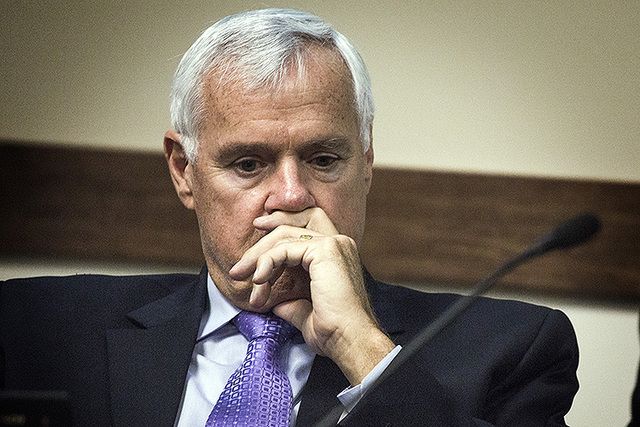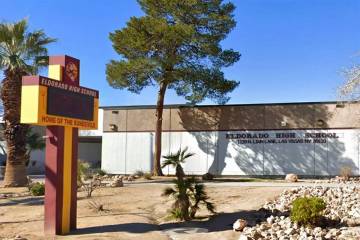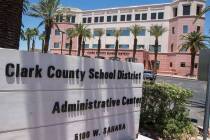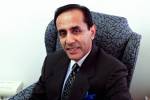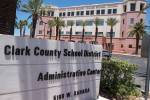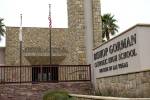Nevada regents examining alleged effort to mislead legislators
Nevada’s higher education system faces a watershed moment Thursday with a rare special meeting to consider allegations that the state agency which oversees all public colleges and universities intentionally misled lawmakers working to revamp the way schools are funded.
The agenda for the special meeting in Las Vegas includes an item that would allow the 13 elected regents to fire longtime Chancellor Dan Klaich on the spot.
The meeting was called after the Review-Journal reported that emails from 2011-2012, obtained by the newspaper under the state public records law, showed the system went so far as to create a false document to give to a legislative committee that was studying ways to make college and university financing more equitable.
Klaich has been busy defending his agency in long letters to state lawmakers in advance of the meeting. Even if the regents, who are often criticized for circling the wagons rather than dealing with controversies, take no action the chancellor ultimately will face a hostile reception when the Nevada Legislature meets in February. Lawmakers from both sides of the aisle say they will introduce higher education reform bills.
Former community college presidents and faculty from various campuses around the state also have formed a coalition to push for massive higher education changes, creating a Facebook group called “NevadaStormComing Public.”
And the Las Vegas Metro Chamber of Commerce has called for an outside inquiry into the system.
And former Assembly majority leader William Horne is calling for Klaich’s removal.
Horne, who was a legislative leader at the time the education formula was reworked, said its time for Klaich to step down and for the regents to seriously evaluate the chancellor’s power, as well as the funding formula and the role of community colleges in the system.
“Whether (Klaich) is found to have done this or not I think it has become virtually impossible for him to continue his job as the chancellor because he’s lost credibility and you need a chancellor that’s going to have some type of credibility,” Horne said. “Even a brand-new chancellor that comes in is going to have to overcome the suspicions that have been raised from this last chancellor, Dan Klaich. I think that’s the level of damage that’s been done.”
Horne said he will attend Thursday’s session to tell the regents just that.
CONTROVERSIAL MEMO
Revelations that Klaich’s agency actively worked to undercut and mislead lawmakers — going so far as to fabricate a memo on the letterhead of a paid consultant — have become a flash-point in already tense relationship between the Legislature and the higher education agency. Some legislators say emails published by the Review-Journal prove what they have long suspected: System officials viewed them with contempt.
Klaich maintains the emails have been taken out of context but has not addressed the heart of the controversial memo in his letters to lawmakers or in statements to the newspaper.
The memo came at a critical moment in a contentious process. Emails show system officials had hoped to gain control of the legislative interim committee by having it hire researchers from a group Klaich viewed as his “special consultant.” When lawmakers chose another consultant, Klaich still brought in the Colorado-based National Center for Higher Education Management Systems, or NCHEMS, telling the center’s then-President Dennis Jones that the lawmaker’s failure to follow his lead was “horrible and embarrassing.”
Lawmakers agreed to let Klaich present his consultant’s analysis, but their own consultant and the Legislature’s fiscal analysts couldn’t determine how NCHEMS came to its conclusions.
At an Aug. 15, 2012, committee meeting, former Senate majority leader Steven Horsford, the chairman of the interim committee, asked repeatedly why details supporting the NCHEMS work wasn’t available to lawmakers. Klaich, according to meeting minutes, told Horsford he didn’t want to “second-guess” a highly reputably organization such as NCHEMS.
In response to Horsford’s complaint about the state agency’s lack of transparency, Klaich’s staff wrote a memo printed on NCHEMS letterhead and made to look like communication from Jones to the chancellor, addressing the committee’s concerns. For added weight, the agency attached Jones’ resume.
Jones later told the Review-Journal he asked the agency to write the memo, which he reviewed for accuracy, because he was pressed for time.
In an email at the time, Klaich told Jones “I will just figure out what you would say and put it on your letterhead :)”
“Make the bill a big ‘un.” Jones replied.
“I assure you it will be worth your time,” Klaich responded.
System officials fretted over whether or not Jones should appear at the interim committee meeting where the memo was presented.
Renee Yackira, who was then a vice chancellor in the system, said in an email that she and fellow vice chancellor Constance Brooks felt it “would be very bad” if Klaich had to defend or even explain the document written in-house on NCHEMS letterhead.
“It won’t seem credible coming from us,” she wrote.
Klaich told Jones that his presence might only cause “mischief.”
Klaich also assured a worried staffer that he couldn’t justify subjecting Jones to “the wrath of Horsford,” and that the faked memo would be enough “to win if this is winnable.”
NCHEMS did come into question, with Horsford telling his committee he felt misled and was dismayed to learn NCHEMS had been hired even though Klaich had previously claimed the researchers had “no affiliation with the system.”
Klaich recently told the Review-Journal there was an honest misunderstanding; Horsford disagrees with that characterization.
RELATIONSHIP QUESTIONED
Higher education officials maintained that NCHEMS was an impartial resource.
Assemblyman Elliot Anderson, chairman of the House education committee, in February 2013 also sought information about NCHEMS and was told “we hired the National Center for Higher Education Management Systems (NCHEMS), the most recognized data center in the United States to help us assign weights independently, and presented those to the Committee,” according to education committee minutes.
Anderson, who recently reviewed the minutes at the Review-Journal’s request, said the system dodged his questions by claiming the consultant was operating independently.
Emails obtained by the newspaper show the agency’s staff and NCHEMS had a close collaboration, with Klaich writing to Jones at one point, “Geez, you fit into our crazy staff perfectly.”
In another exchange, Jones told Klaich “You’re on the right track and laying out the argument so I could make it if asked to.”
Anderson said the emails prove NCHEMS’ independence “was a fiction that was presented for the benefit of the Legislature.”
“You’ve got to wonder what’s the agenda? Why are they concerned about giving each other ammo in this fight? It’s obvious that they have a stake in this,” the Las Vegas democrat said.
Both Anderson and Assemblyman David Gardner, R-Las Vegas, have called for Klaich to resign, and both say they’re considering system reform bills. Horsford, who has since left office, has also called for Klaich’s resignation.
PRIOR CRITICISM
The flap over the fake memo follows on a 2015 controversy that also involved NCHEMS.
The Review-Journal last year reported that the think tank had buried a negative assessment of Klaich’s agency after officials expressed fear that it would be used as a “bludgeon” as lawmakers were considering a system breakup.
An attorney hired by the regents in response to the newspaper reports determined that Klaich at the time feared that he would lose his job, but that the NCHEMS researchers acted independently in softening their findings.
Regent James Dean Leavitt has said he learned many lessons since that investigation and he hoped his fellow regents had also, saying, “Last year we gave him a pass. I don’t think there’s any doubt about that.”
The special meeting agenda indicates the regents will examine the agency’s relationship with the interim committee, the hiring of NCHEMS, and the controversial memo.
Contact Bethany Barnes at bbarnes@reviewjournal.com or 702-477-3861. Find her on Twitter: @betsbarnes



